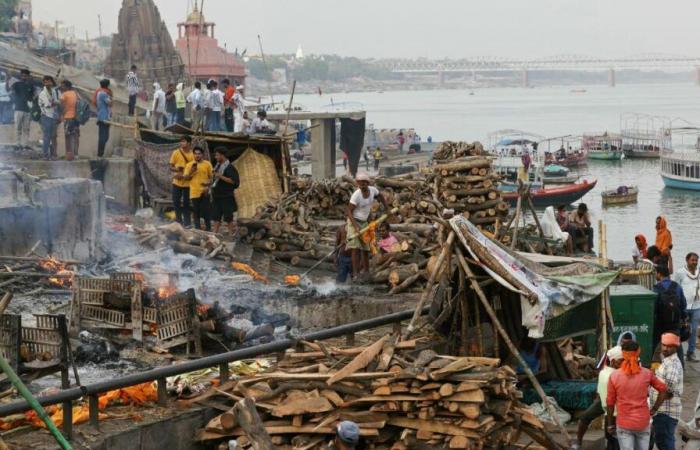The weakest stay only a few days, the most far-sighted sometimes wait for years. But all are convinced, as Hindu religious tradition teaches, that this one-way pilgrimage to this city, located in the north of the country, will ensure them eternal peace.
“This is God’s country”rejoices Badri Prasad Agarwal. Despite his 92 years, he did not hesitate to travel more than a thousand kilometers from his home in Rajasthan to cross the threshold of death. Peacefully.
Dying near the banks of the Ganges is a guarantee of being cremated there and seeing one’s ashes scattered in the dark waters of the river from the “ghats”, these famous stone steps used by all those who come to bathe.
It is also the certainty that his soul will directly reach “moksha”, the definitive liberation from the cycle of reincarnations.
The nonagenarian assures that God has entrusted him with only five months to live. He will spend them in one of the many establishments that welcome believers on the threshold of death.
“I talk to God every day”confie Badri Prasad Agarwal, “soon I will be at peace, in his house”He took up residence at Mumukshu Bhawan, “the house of those who seek salvation,” a hospice with about forty rooms ideally located a few minutes’ walk from the Ganges.
There, for centuries, the roar of the flames of the pyres has never stopped.
Also known as Benares, the city of Varanasi is entirely dedicated to Shiva, one of the main gods of Hinduism. The one, among other things, of the destruction that precedes creation.
Believers have been flocking there for centuries, alone, in couples or with families. Most have saved their entire lives to pay for this one-way trip.
“Then I will attain salvation.”
Nathi Bai, 72, arrived in Varanasi two years ago. She is looking forward to one day being cremated at the Manikarnika ghat. “I want to be cremated so that my soul can rest in peace and my ashes can be immersed in the Ganges.”explains the resident of the Mumukshu Bhawan hospice.
What she saw of the cremation ceremonies confirmed her wish. “When people are sent to be cremated, it is as if they are seated on a throne like a god.”she comments, “There is so much respect, everything is so well done”. Gulab Bai, for her part, arrived in Varanasi more than thirty years ago with her husband. He died there after seven years. Even though her children continue to visit her, she says she is ready to leave. Dressed in her saffron sari, the sacred color of Hinduism, she bides her time, serene. “Dying and being cremated here breaks the cycle of life and death”she recites, “I will then attain salvation”.






